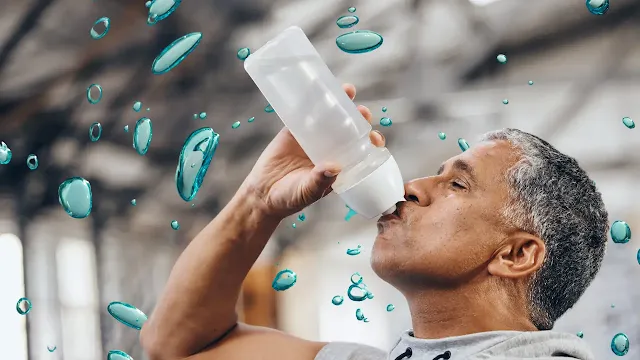But why is hydration important for your health? What are the benefits of staying hydrated? How can you ensure that you are drinking enough water every day?
Hydration and health
In this article, we will answer these questions and provide you with some actionable insights to help you improve your hydration and health.
What are the Benefits of Hydration for Your Health?
In the intricate orchestration of bodily functions, hydration and health share an inseparable dance. Water, the elixir of life, plays a pivotal role in maintaining optimal health.
Its significance extends beyond quenching thirst; it serves as the cornerstone of cellular processes, ensuring physiological equilibrium.
Hydration and health intertwine at the cellular level, influencing enzymatic activities and molecular reactions critical for metabolic homeostasis.
Adequate water intake facilitates nutrient transport, bolstering the absorption of essential compounds fundamental to bodily functions.
Staying hydrated has many benefits for your health. Some of the benefits are:
- It regulates your body temperature. Water is essential for your body to maintain its normal temperature, especially when you are exposed to heat or cold. Water helps your body to sweat, which cools you down, and to shiver, which warms you up. Hydration also prevents dehydration, which can cause heat stroke or hypothermia.
- It supports your organ functions. Water is involved in many vital processes in your body, such as digestion, absorption, circulation, and excretion. Water helps your body to break down food, transport nutrients and oxygen, remove waste and toxins, and lubricate your joints and tissues. Hydration also prevents kidney stones, urinary tract infections, and constipation.
Hydration for Holistic Well-being: Cognitive, Physical, and Aesthetic Benefits of Water
- It enhances your cognitive and mental health. Water is crucial for your brain to function properly. Water helps your brain to produce neurotransmitters, which are chemical messengers that regulate your mood, memory, attention, and learning. Hydration also prevents headaches, fatigue, confusion, and mood swings.
- It improves your physical performance and appearance. Water is important for your muscles, skin, and hair. Water helps your muscles to contract, relax, and recover, which improves your strength, endurance, and flexibility. Water also hydrates your skin and hair, which makes them look smooth, soft, and shiny.
How to Ensure that You Are Drinking Enough Water Every Day?
You might be wondering how to make sure you are getting enough water each day now that you are aware of the health benefits of being hydrated. The following advice will assist you in maintaining proper hydration:
Follow the general guidelines
Monitor your urine color and volume
Drink water before, during, and after exercise
Choose water-rich foods and beverages
Conclusion
Hydration and health are closely linked. Hydration refers to the balance of fluids in your body, which depends on how much water you drink and how much water you lose.
Health refers to the state of your physical, mental, and social well-being, which depends on many factors.
Staying hydrated has many benefits for your health, such as regulating your body temperature, supporting your organ functions, enhancing your cognitive and mental health, and improving your physical performance and appearance.
To ensure that you are drinking enough water every day, you can follow the general guidelines, monitor your urine color and volume, drink water before, during, and after exercise, and choose water-rich foods and beverages.
By staying hydrated, you can not only improve your health but also your quality of life.

